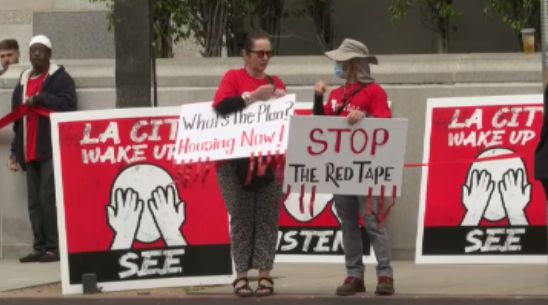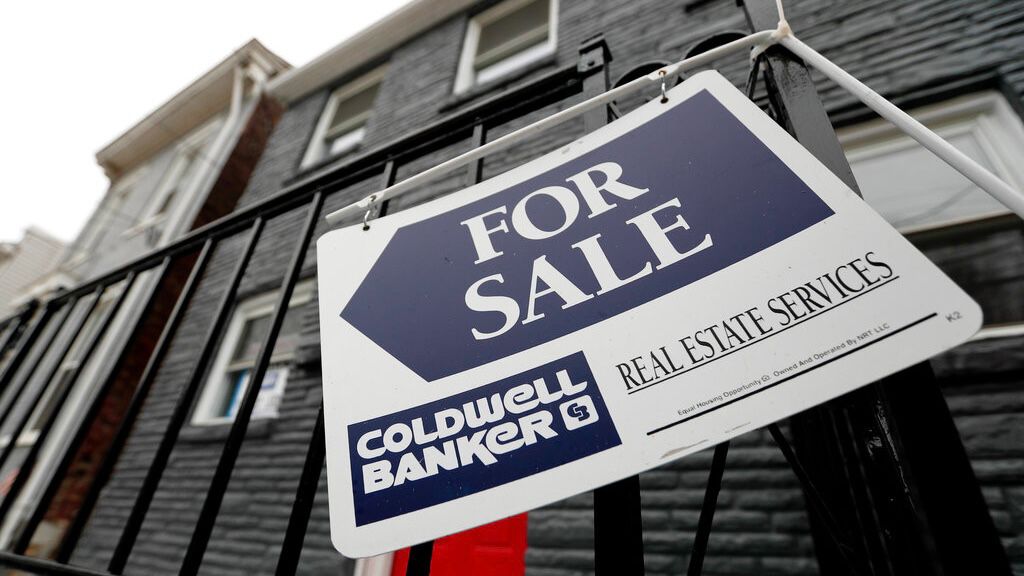EDITOR'S NOTE: Multimedia journalist Kristopher Gee spoke with an artist in DTLA about how the looming eviction moratorium is affecting her life and work. Click the arrow above to watch the video.
LOS ANGELES — Apartment associations and landlords across Southern California are pessimistic about Gov. Gavin Newsom's plans to forgive all past-due rents from tenants financially impacted by the coronavirus pandemic and are bracing for an extension of the state's eviction moratorium.
"This is just prolonging the agony for a lot of people," said Dan Yukelson, the executive director of the Apartment Association of Greater Los Angeles, which represents more than 10,000 members.
Jonathan Cohen, the chief operating officer of Universe Holdings, said the governor's plan to pay off all past-due rents will be "complicated and wrapped up in bureaucracy."
"I also think that because many residents are just not paying because they don't have to, the program will run out of money before the rents of truly needy are paid," Cohen said in an email to Spectrum News. Universe Holdings has a multifamily portfolio of more than 2,800 units, mainly across Southern California.
With the national and statewide ban on evictions set to expire at the end of this month, reports began to surface on Monday that Gov. Newsom is meeting with other lawmakers to discuss whether to extend the state's eviction moratorium.
The economic impact of the coronavirus pandemic left millions of workers in especially hard-hit industries, such as events, restaurants and leisure and hospitality, with hours or pay cut, furloughed or out of a job. The state's unemployment has picked up in recent months but is still far from pre-pandemic levels.
Last summer, Newsom signed legislation to protect landlords from foreclosure and tenants from eviction until March 2021. Tenants who couldn't pay rent due to COVID-related reasons would need to work with their landlord and develop a payment plan.
During the moratorium, tenants are still responsible for paying any unpaid amounts to the landlord and can not be evicted.
Newsom extended the moratorium from January to the end of June.
As the end of the month approaches and the moratorium is set to expire, landlords and apartment groups say it is time for the moratorium to end.
"At this point, it should sunset," said David Cordero, the Apartment Association of Orange County executive director. "We need to get back to normalizing business operations. Extending the moratorium for an additional month, two or three months, I don't know how that is going to make a difference."
Cordero, whose organization represents more than 3,000 rental professionals, said Newsom forgiving struggling tenants' all past due rent is a great idea. But seeing how California has been slow to release money for the state's rent relief program, he doesn't know how this new program would work.
According to the state, under the state's rent relief program, eligible renters can apply for landlords to be reimbursed for 80% of unpaid rent between April 1, 2020, and March 31, 2021. The landlord must agree to waive the remaining 20% of the due rent.
The Associated Press reported that Congress had given California more than $5.2 billion to help pay off people's rent. The amount is more than enough to cover all of the unpaid rent in the state, the Associated Press reported, citing a Newsom official.
However, of the $490 million the state has received from applicants in the state's rental assistance program, only $32 million has been distributed.
Yukelson of the Apartment Association of Los Angeles and Cordero said many struggling tenants might not qualify for the governor's new program since they are earning above the area's median income. Some renters are also still gaming the system and not cooperating with the landlord to complete the process, both heads of the Apartment Associations said.
"The [new program] would only help low-income tenants," Yukelson said. "There's still going to be a lot of owners holding the bag on this thing."
Cordero added that Newsom needs to be more specific on who would qualify for this new pay-off program.
"The devil is in the details," Cordero said.
Cohen, the chief operating officer of Universe Holdings, said the past 15 months had been a challenge for his company. The company has worked with tenants, that sought help; offered debt forgiveness to several residents who agreed to move out; and bought out some residents who live in rent-controlled housing.
Cohen said the governor's plan is good for those who truly need it. But it could backfire.
"I think unscrupulous residents who can pay rent, will stop paying it because they know that the government program will bail them out," Cohen said. "That will hurt landlords because there will be a lag from the time the rent is due until the program money is paid. We have seen this consistently in the previous programs. There also needs to be an income test to be eligible for the assistance otherwise the abuses of the programs will continue."
Bill Christiansen, the vice president of government affairs for the Apartment Association of Orange County, said it's time for the governor to lift the moratorium.
While there is a belief that all apartment owners are corporate-owned, that's not the case, Christiansen said. Many mom-and-pop landlords invested their life savings for a fourplex or a small apartment building as a way to earn income during retirement. Many of them continue to struggle.
"We have some members that now have arrears of $20,000 to $25,000, and more," Cordero said. "As you know, they continued to pay their mortgages and utility bills, insurance and property tax — those didn't stop during the pandemic."
Christiansen said no one wants to see people getting evicted.
"We are in the housing rental business, not eviction business," he said.











